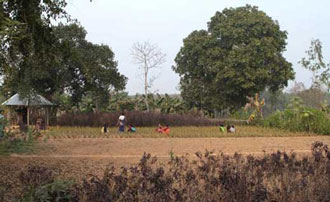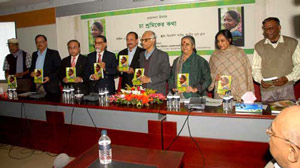
Vivienne Westwood and Marie Claire supporting forest people in Bangladesh
International designer Vivienne Westwood and international fashion magazine Marie Claire have joined forces to highlight the issue of deforestation. This global collaboration will combine the sale of the T-shirt dress with a special Rainforest editorial section in Marie Claire. Proceeds from the sale of the T-shirt dress will support the forest people in Bangladesh through SEHD activities.
 For the first time ever, an international designer (Vivienne Westwood) and an international fashion magazine (Marie Claire) have joined forces, to launch an exciting global project that both drives awareness of deforestation and influences the current trend of up-cycling your clothes.
For the first time ever, an international designer (Vivienne Westwood) and an international fashion magazine (Marie Claire) have joined forces, to launch an exciting global project that both drives awareness of deforestation and influences the current trend of up-cycling your clothes.
In Vivienne’s words ‘Buy less, choose well’.
Rainforests play a vital role in maintaining a stable global climate and environment; they are vital to the survival of all 7 billion of us. Deforestation is one of the largest contributors to climate change. Forests are on the global agenda; the UN General Assembly has declared the year 2011 as the International year of Forests.
To mark this year of change, Vivienne Westwood has designed a limited edition T-shirt dress exclusively for Marie Claire international readers. Not only does this eco friendly T-shirt dress empower any Fashionista, all proceeds from the sale of the T-shirt dress will support the forest people in Bangladesh, whose lives and livelihoods have been endangered by deforestation.
This global collaboration will combine the sale of the T-shirt dress with a special Rainforest editorial section (Guest Editor, Vivienne Westwood), which will be published in 24 editions of Marie Claire from May 2011.
To produce and sell the T-shirt dress online Marie Claire and Vivienne Westwood have partnered with the Fair Trade organisation People Tree. People Tree only uses 100% organic fair trade cotton and all their clothes are made entirely by hand, helping to create livelihoods for disadvantaged groups in Bangladesh, India and Nepal.
Buy this Vivienne Westwood Limited Edition T-shirt dress for only £28 from People Tree and £7 from each sale will help support Forest people in Bangladesh through SEHD activities. Read about SEHD’s organic farming initiative for more information about the project that will be funded.


